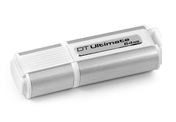Kingston Launch SuperSpeed USB 3.0 USB Flash Drives
USB 3.0 has been in development since 2007 and is the next major revision to the Universal Serial Bus technology. Designed from the ground up to have the same ease-of-use and plug and play capability offered by USB 2.0 but with a whopping 10X performance increase in data transfer rates. The speed improvements are achieved by using a technology that has been dubbed “SuperSpeed” – this allows multiple streams of data transfer and boosts its peak bandwidth to 4.8 Gb/s (~572 MB/s).
All new USB 3.0 devices will be compatible with standard USB 2.0 and USB 1.1 ports but if you connect a USB 3.0 device to an old UBS port it won’t run at the SuperSpeed transfer rates. To only way to get benefits of SuperSpeed is to use USB 3.0 devices, cables and USB ports with a USB 3.0 host controller.
To put the speed improvements into context if you transferred 100 albums from a PC to MP3 player using a USB 2.0 you would expect the transfer to take around 2 minutes. If you transferred the same albums using a PC equipped to support USB 3.0 and used USB 3.0 cables connected to an MP3 player (next generation USB 3.0) then your transfer time would drop to around 15 seconds!!
USB 3.0 is likely to be welcomed by users wanting to save and move HD video files around. This format by its very nature is data intense and therefore moving files around via USB 2.0 can take some time.
Although Intel have stated they will not support USB 3.0 until late 2011 but in the interim USB 3.0 upgrade cards, USB
3.0 cables and USB peripherals will start to trickle into the market. One of the first mainstream USB 3.0 products to be released is a USB flash drive from Kingston Technology – named the Data Traveller Ultimate it has a read speed of 80MB per second and a write speed of 60MB per second!
With a hefty price tag and scarcity of PC’s that will deliver the real USB 3.0 benefits on offer it’s a product that’s likely to appeal to the early adopters but very few others.
USB flash drives are incredibly popular products not only for personal use but also within the promotions and corporate gift sector where literally tens of millions of branded USB flash drives are given away each year. In this sector the much higher costs for USB 3.0 mean we’re unlikely to see USB 3.0 flash drives adopted for the next few years. So, if you’re interested in getting a USB 3.0 flash drive anytime soon then you’ll need to dip into your own pocket to buy one (and the other components needed to really take advantage of the benefits on offer from SuperSpeed USB 3.0).


